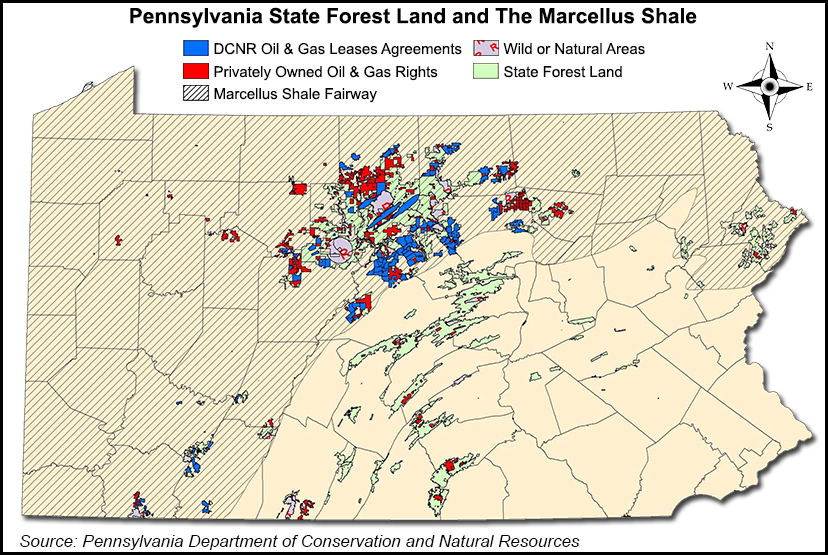Marcellus | E&P | NGI All News Access | NGI The Weekly Gas Market Report | Utica Shale
Wolf Reinstates Leasing Ban in Pennsylvania Forests, Parks
In one of his first significant moves since taking office Jan. 20, Pennsylvania’s Democratic Gov. Tom Wolf signed an executive order on Thursday reinstating a moratorium on oil and gas leases in state-owned parks and forests, drawing widespread praise from the state’s environmental groups.

Wolf, who indicated during his campaign that he was not in favor of Marcellus Shale development on public lands, signed the order during a ceremony at Benjamin Rush State Park in Philadelphia. His move reversed an executive order issued by his predecessor, Republican Gov. Tom Corbett, who had sought to raise $95 million to help plug a widening state budget gap (see Shale Daily, May 23, 2014).
In recent weeks, Corbett administration officials had told NGI’s Shale Daily that if Wolf reversed Corbett’s order, state government would have to find a new way to generate the $95 million in projected revenue from the leases at a time when Pennsylvania’s budget deficit is nearly $2 billion (see Shale Daily, Jan. 16).
While critics of the reinstatement called it a purely “political move,” environmental groups who had resisted Corbett’s order hailed it.
“We are pleased to see Gov. Wolf move quickly to protect our state parks and forests from natural gas drilling,” said PennFuture’s acting President John Norbeck, who added that state-owned land is held in the public trust and protected by Pennsylvania’s constitution.
Pennsylvania Environmental Council President Davitt Woodwell said reversal of Corbett’s order was to be a top priority for his organization this year and commended Wolf for “reasserting a key safeguard for our public lands so early in his administration.”
A moratorium on state leasing was first enacted by former Democratic Gov. Ed Rendell in 2010 (see Shale Daily, Oct. 27, 2010). When Corbett lifted the ban in May, it would have continued to bar new leases for surface operations and allowed operators sub-surface leases to access state-owned mineral rights from adjoining private land.
Wolf’s move comes at a time when many Appalachian operators plan to reduce their spending on land acquisitions in response to falling commodity prices.
“Our hopes are certainly high to work constructively with Gov. Wolf. Unfortunately, this action — made without any industry input — to ban the safe and tightly-regulated development of natural gas from beneath taxpayer-owned lands flies in the face of common sense,” said Marcellus Shale Coalition President David Spigelmyer. “Non-surface taxpayer-owned energy development — through utilizing advanced horizontal drilling technologies that ensure no surface impacts — is not only an enormous current and potential source of revenue for the Commonwealth at a time when revenues are sorely needed, but expanded natural gas production and use is enhancing air quality and boosting our region’s economy.”
Although a similar debate has unfolded in Ohio about drilling on state-owned land, West Virginia has recently started to open waterways and wildlife management areas to lease bids that are fetching offers upwards of $5,000/acre (see Shale Daily, Oct. 30, 2014; Oct. 3, 2014).
Pennsylvania has conducted just three lease sales since 2008, when development in the Marcellus Shale began in earnest. But since 1947, horizontal and vertical wells on state-owned land have generated more than $736 million in revenue, according to the Pennsylvania Department of Conservation and Natural Resources (see Shale Daily, April 16, 2014).
© 2024 Natural Gas Intelligence. All rights reserved.
ISSN © 2577-9877 | ISSN © 1532-1266 | ISSN © 2158-8023 |
